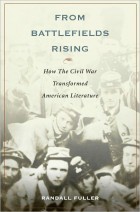Oxford University Press, $29.95, 251 pages
Behind the backdrop of the Civil War, Randall Fuller brings us closer to the most influential literary voices of the nineteenth century in his beautifully written From Battlefields Rising. Albeit, most of those authors were from Massachusetts (some of whom now rest in Concord’s Sleepy Hollow Cemetery, namely: Thoreau, Emerson, Hawthorne, & Alcott), the remainder still hailed from the eastern seaboard (Whitman & Melville). Therefore, if one is looking to find fault it can only be in the lack of the Southern perspective. During this era, the nation was deeply divided over the issue of slavery. One was either following the cause of abolitionism or one was not. This book primarily documents the cause of the Union sympathizers. Is it any wonder that those great minds became immersed in the war? It not only overtook their lives but their artistic works as well. Herman Melville not only chronicled the war through his poetry, he actually became a participant, at the age of 44, in a military operation.
One of the most poignant chapters is Phantom Limbs, describing the suffering of the soldiers injured in battle and bringing to light two artistic works. ‘Hospital Sketches’ was a novel by Louisa May Alcott chronicling her real life experiences as a nurse. In one excerpt we are told of a soldier anticipating the Day of Judgment when all will be made whole again. “What a scramble there’ll be for arms and legs”, he said, wondering “if we shall get our own again. If we do my leg will have to tramp from Fredericksburg, my arms from here I suppose, and meet my body, wherever it may be.” A fascinating article The Case of George Dedlow caused a “sensation” after publication in the popular Atlantic Monthly; the dominant goal of this “new literary and anti-slave magazine” was to “wage war upon southern society.”
No one showed more compassion than Walt Whitman. (His famous Leaves of Grass would be expanded time and again throughout his wartime experiences.) He seemed unable to leave the bedsides of the often limbless souls that survived this hellish war until his own health was compromised in 1864. “His body was sacrificed”, he said, though he continued to bathe not only the soldiers’ wounds but their souls as well. But while the Civil War may have drained the life out of Hawthorne (his unfinished work was, ironically, The Elixir of Life), a renewal of sorts took place when an unknown author came to the forefront in 1868. She brought new hope into the lives of a generation of people grappling the loss of some 620,000 of their men. The Gates Afar let them know that they would, one day, see their beloved ones again. After all, as Thomas Wentworth Higginson so aptly put it, death was simply going from “one room to another.” With that said, it’s a touching ending to a more than satisfying book.
Reviewed by Kathleen Godwin

